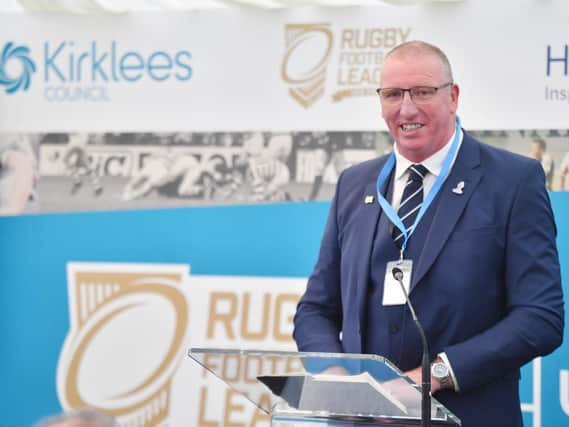RFL boss Ralph Rimmer urges Government for return of crowds


That had been the scheduled date by the Government to see attendances return to sporting venues following Covid but it is looking increasingly unlikely.
Like all sports, rugby league has suffered with no supporters attending games since mid-March and there are genuine fears about how it will survive if the policy of closed-behind-doors fixtures continue.
Advertisement
Hide AdAdvertisement
Hide AdThe Premier League kicks-off tomorrow with supporters still locked out and, so far, only a limited number of pilot projects across different sports seeing limited numbers of fans enter have gone ahead.
Rugby league has not received one of those and, in his latest blog, Rimmer wrote: “Sports need crowds. And fans need the opportunity to choose to watch their favourite sport in a controlled, socially distanced, and largely outdoor environment.
“Sports including Rugby League are expert in managing numbers of fans entering stadia, enjoying sport, and exiting safely.
“The Government had previously earmarked 1 October as the target date for the widespread reopening of major sporting fixtures. This is now being reviewed but as of today no final decision has been made on when it will go ahead.
Advertisement
Hide AdAdvertisement
Hide Ad“Rugby League respects that Government and health officials must conduct a thorough review. Public health has been at the forefront of everything that Rugby League has done throughout this period.
“At all times in our regular dialogue with Government I have stressed this commitment and this morning I have written to the Sports Minister to reiterate this and to urge that the 1 October date remains the target for socially distanced crowds.
“It is imperative that momentum is maintained in providing sports with a clear roadmap to first socially distanced limited crowds, safely building to increased crowds.
“Throughout the Government’s guidance on the return of sport a distinction has been made between indoor and outdoor spaces. Stadiums are large, outdoor spaces, managed and supported by experts in the flow of people, including via local transport and travel plans. Attending sport can be as safe or safer than other comparable leisure activities. And it is a choice.”
Advertisement
Hide AdAdvertisement
Hide AdSuper League returned behind closed doors on August 2 and - with different regulations in France - Catalans Dragons will see up to 5,000 fans allowed to watch their game against Wigan Warriors in Perpignan tomorrow as they play their first home fixture since lockdown.
Rimmer continued: “Rugby League is ready.
“Behind closed doors event management has been exemplary. All Super League clubs, with support from the RFL and Super League Europe, have worked exceptionally hard with local authority partners to complete all required plans for socially distanced crowds in their stadia.
“This includes supporting national track and trace, fan data management and health declarations, temperature testing plans and more.
“We have participated in the wider UK Sport/DCMS pilot project and deployed all learnings to date in our sport’s planning. Discussions on a Rugby League specific pilot are also live.
Advertisement
Hide AdAdvertisement
Hide Ad“In unlocking the wider economy including the leisure and attractions sectors, the Government has been rightly focused on both safety and economic viability. Sport is no different. The sport sector drives economic prosperity and social change in the UK contributing over £16bn to the UK economy and employing more than 600,000 people.
“Sport must be central to the national and local recovery. It must not be a casualty. It is about jobs and local economies – and more. The experience of playing and watching sport is also fundamental to the physical and mental wellbeing of millions of people.
“The financial losses to Rugby League of not being able to admit fans is huge, and it is mounting week on week. The impact on whole game revenues is up to £2m a week.
“This means jobs in both clubs and their local communities are at risk. It risks all the investment that the sport makes in participation, and in health and education projects which make such meaningful social impacts in our communities.
Advertisement
Hide AdAdvertisement
Hide Ad"Sport needs to drive its income and protect jobs through ticket sales and associated spend; and minimise the massive losses from this to date, and projected losses, and from the risks to commercial and sponsorship arrangements.
"The ambition must be to admit socially distanced crowds into our stadia from 1 October with a clear roadmap to building to fuller capacities. Rugby League is ready."
Comment Guidelines
National World encourages reader discussion on our stories. User feedback, insights and back-and-forth exchanges add a rich layer of context to reporting. Please review our Community Guidelines before commenting.